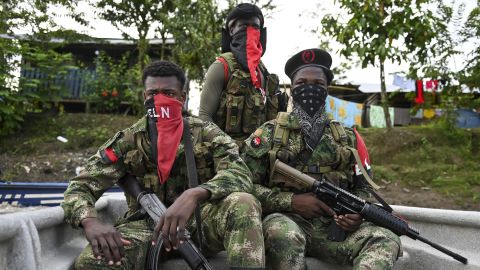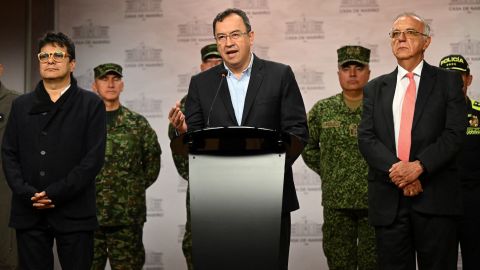CNNE
—
What began as a hopeful announcement of a six-month ceasefire with the National Liberation Army (ELN) and other armed groups in Colombia, has ended in a political entanglement that casts doubts on the armed groups’ desire for peace – and raises questions about Colombian President Gustavo Petro’s future announcements regarding the ongoing peace process.
The Colombian government’s own chief negotiator, Otty Patiño, has since acknowledged that the agreement was not reached bilaterally. On Wednesday, the Colombian government spokesman announced that the executive order for the ceasefire had been suspended.
Analysts agree that it was a mistake to make the announcement without reaching a bilateral agreement, and believe that Petro’s government now faces a long way to go to right the wrong.
Here is a summary of what happened in recent days regarding the agreement of a bilateral ceasefire – that never happened – and what may happen in the future.
President Petro announced the ceasefire on December 31, giving hope to many sectors, especially communities plagued by violence.
He said that for six months, starting January 1, there would be a ceasefire with the ELN and four other armed groups: la Segunda Marquetalia (the Second Marquetalia), el Estado Mayor Central (High Command of the FARC), Autodefensas Gaitanistas de Colombia (the Gaitanista Self-Defense Forces of Colombia) and the Autodefensas de la Sierra Nevada (Self-Defence Forces of the Sierra Nevada).
“The main objective of the ceasefire will be to stop the humanitarian impact… to halt offensive actions and to avoid armed incidents between law enforcement and unlawful organizations,” the statement said.

The announcement was applauded by many, including United Nations Secretary General Antonio Guterres, who in a statement indicated that he “welcomes” the announcement of the bilateral ceasefire since it “brings renewed hope for comprehensive peace to the Colombian people as the New Year dawns.”
According to Petro, the Organization of American States (OAS), as well as the Catholic Church and the Ombudsman’s Office, would oversee the bilateral ceasefire.
But the bilateral agreement did not happen.
Three days later, the ELN said in a statement that there was no bilateral ceasefire agreement with the Colombian government as Petro had announced on December 31.
“The ELN Dialogue Delegation has not discussed with the administration of Gustavo Petro any proposal for a bilateral ceasefire, therefore there is still no agreement on that matter,” says the January 1 statement.
The guerrillas said that “the ELN only complies with what is discussed and agreed upon at the Dialogue Table where we participate,” adding that the announcement is understood to be “a proposal to be reviewed in the next cycle” that will be carried out in Mexico.
Reuters reported that the announcement completely shocked the public, and after the announcement, Petro convened a meeting with the ministers of defense, interior and the high commissioner for peace to analyze the position of the rebel group, made up of some 2,400 fighters.
Colombian Interior Minister and government spokesman Alfonso Prada Gil on Wednesday announced at a press conference that the executive order establishing a ceasefire with the ELN had been suspended.
A new meeting between the parties is expected at negotiations between the ELN and the government of Colombia that will resume in Mexico
“We became aware of the statement of the ELN, and last night we made the decision to suspend the legal effects of that executive order until the negotiation table is reactivated in the coming days, and at that table we are going to bring that request of the protocols on behalf of the government, and we hope that the ELN will bring theirs, so that we can reactivate the dialogue,” he said.
Prada Gil invited the ELN to agree to a temporary ceasefire, while the next round of negotiations begin in Mexico.
After the uproar caused by the announcement, the head of the government’s delegation for the negotiation, Otty Patiño, did not clarify that Petro made a unilateral announcement without consulting the guerrillas, but instead “celebrated” the ELN’s decision to “examine the terms” that could make the ceasefire possible.

He also ventured to “interpret” Petro’s failed announcement as a “first step towards a new understanding and a new future.”
Analysts have agreed that Petro’s announcement of a bilateral ceasefire was a mistake, but some posit that it was the president’s way of pressuring the guerillas and, trying to advance the peace process with the ELN.
“It is evident that it is a mistake to proclaim a ceasefire with several organizations without having agreed to do so with all of them and without having the protocols for the oversight either. It is a mistake to commit the international community to something that is not yet agreed by the parties, but we are already in it,” political analyst Leon Valencia said Tuesday.
Meanwhile, retired Army Colonel Luis Alberto Villamarín said, Petro’s bilateral announcement was a move that backfired.
“He considered that by making a move like this he was going to subdue the ELN. Because the only means the ELN has to put pressure on the negotiating table is precisely their terrorist actions. And if the ELN commits to a bilateral ceasefire, that will prevent them from being strong on the negotiating table,” Villamarín said in an interview on CNNE’s Conclusiones.
“The only argument the ELN has is terrorism and Mr. Petro thought that he could take that away from them, tying their hands,” said the retired Army Colonel. “It was calculated but the ELN responded in kind,” he added.
Petro’s goal is to achieve what he calls “total peace,” which is also a political goal of his government.
He wants to disarm armed groups and organized crime and put an end a decades-long armed conflict that has left at least 450,000 dead and millions displaced.
And with that in mind, Petro’s administration has a two-prong approach: a peace negotiation with ELN guerrillas that have a political agenda, and legal processes with criminal organizations, which have no political agenda, said political analyst Ariel Avila, who is also a senator for the Green Party.
“This ceasefire includes the five organizations, the largest armed groups, and therefore safety could improve in about 180 municipalities… in the country,” Avila said in an interview with CNNE’s Conclusiones. “There will be areas where relief will be very low, as there are others where these groups (sic) have total relief where relief will be much greater.”
Despite Petro’s mistake of making that announcement without a bilateral agreement in place, he should still try and reach to reach a similar agreement, say experts, since the proposal was made public and it has been welcomed by the international community.
“Gustavo Petro made the bold move to propose a bilateral ceasefire without discussing it with the armed forces and with the ELN. Now it is known and widely accepted and supported by the international community. What is appropriate now is to agree on it urgently,” said León Valencia.
And if this agreement is reached, it would be twice as good, according to Avila, it will entail signing an agreement with the ELN, and implementing a law abiding process with the criminal organizations.
“The criminal delivers truth and delivers goods and in return the state offers a reduction of the sentence,” he pointed out.

